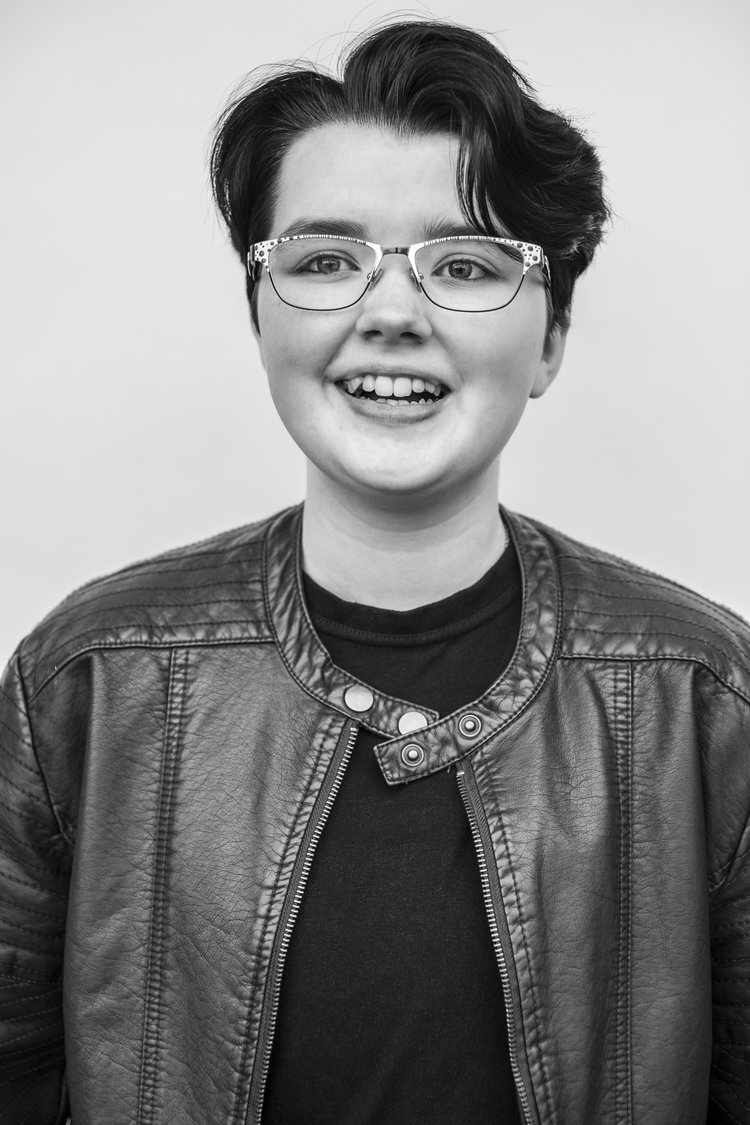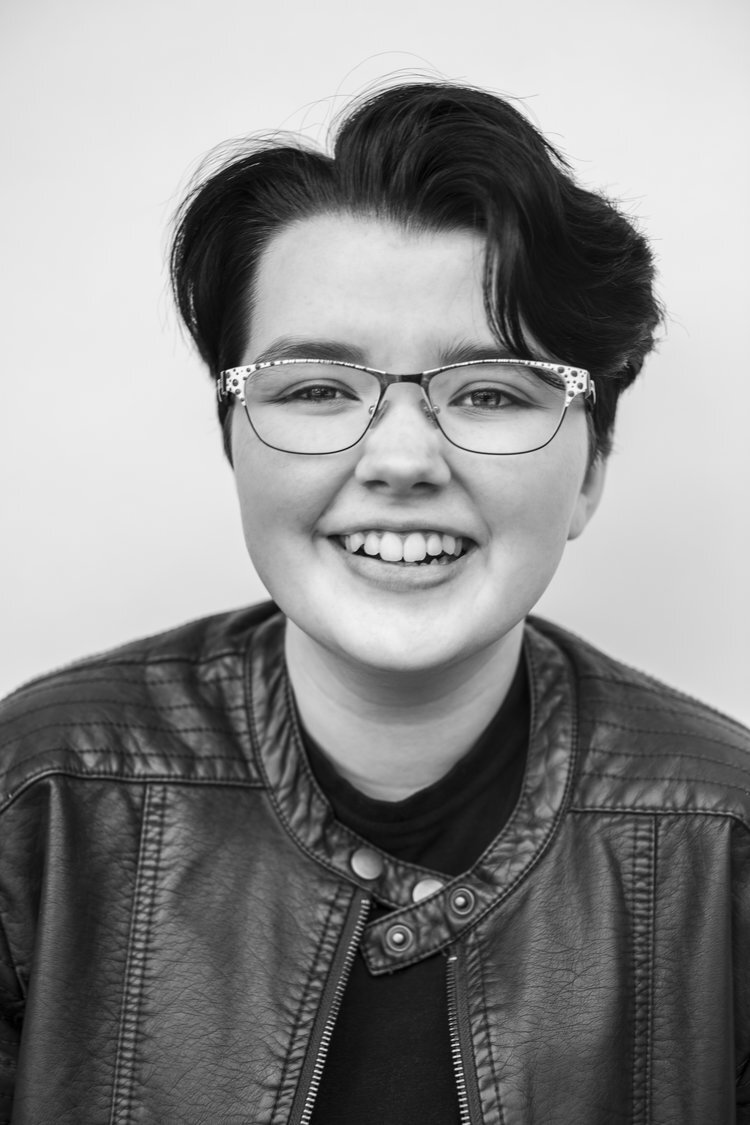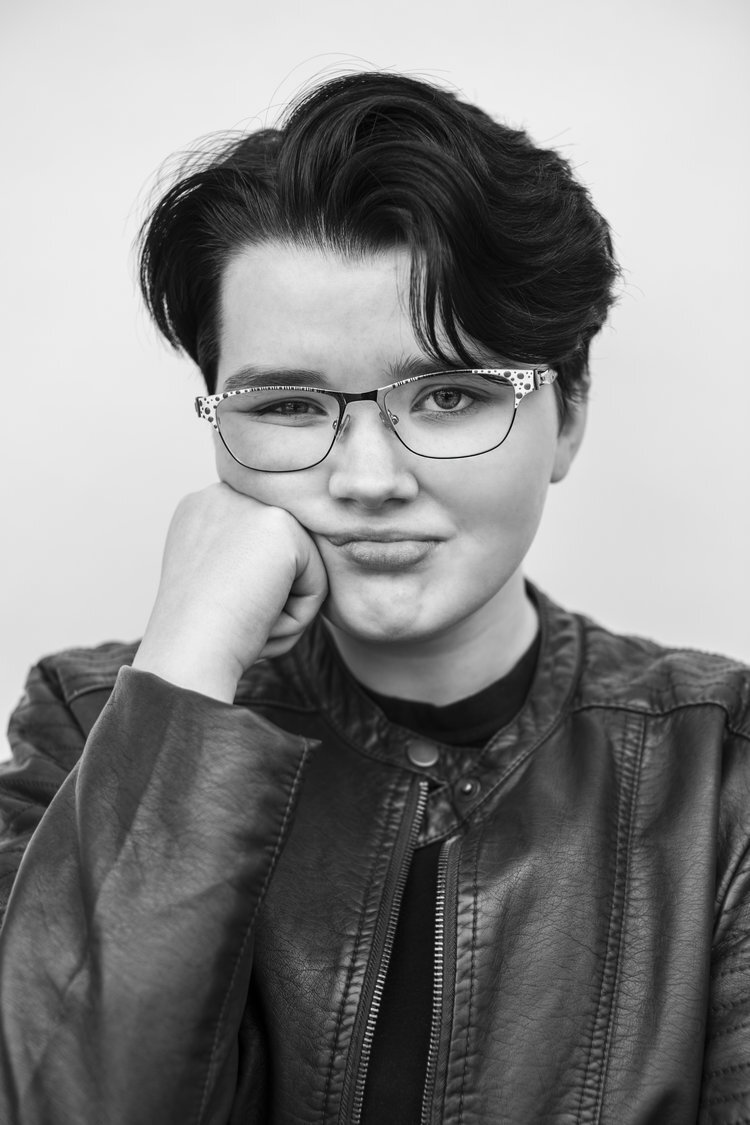RONAN
ALASKA | SERIES #3
My name is Ronan and I am a 15-year-old queer transgender male. I have dealt with mental health issues and childhood trauma for the majority of my life, and I live in Anchorage, Alaska.
When I was about 4 to 6 years old, I began having thoughts about wanting to “be a boy.” I remember I used to wish every single night that I would wake up having been born male. I dismissed this by telling myself something like, “Oh, my brother has always wanted a brother instead of a sister, so he would like me and play with me more if I were a boy like him.” I vividly remember standing in front of the bathroom mirror and crying angrily (and quite dramatically) asking myself and the universe why I was born female.
On one occasion, I recall dressing in my brother’s clothing, stuffing my hair in a baseball cap, and putting on a pair of his sunglasses to trick my mom into thinking I was him. I thought it was just a silly joke at the time, but what I didn't recognize was how good it made me feel to be seen as a masculine person.
I never spoke of the feelings I experienced when I was younger to my parents or anybody else; I didn't understand what gender was, specifically what mine was, and what it meant to me. I just went along with the notion that I was born in the body I was born in, so that must mean that I am a certain way.
I wasn't necessarily big into Barbie dolls or things deemed super feminine, but I was obsessed with Hannah Montana and things that were labeled more gender neutral, rather than monster trucks and whatever else someone might consider “boy things.”
I began discovering my sexuality long before I even considered that I wasn't cisgender. I only knew of two labels when I was in elementary school, gay and straight, and I didn't have the language or knowledge to voice how I felt during that time.
In about third grade, when I started attending public school, I had a conversation with my two best friends at the time about how no matter this or that, we’d all still be friends. The conversation drifted towards sexuality, one of them said that “Even if one of us liked girls, we’d still be friends.” In my mind I thought to myself, “Wait a minute, do we all just pretend that we don't like both girls and boys?” I just assumed it was some unspoken thing that everyone dealt with. Again, I never voiced these thoughts and feelings I experienced to anyone, because I thought it wasn't necessary. I thought that everyone must have been thinking and feeling the same way as me.
I didn't necessarily acknowledge my sexuality again until I hit middle school. A few of my friends were LGBTQ+, and I was beginning to see and learn what certain words meant as I was introduced to a community I would soon call my own.
For a hot second I thought I might've been a lesbian, but then I realized that I definitely was into guys. But the thing was, even my feelings for boys confused me. I felt like I liked them in a different way than I was supposed to. I felt like I was meant to like boys, I know I did, but what I didn't realize was that I was supposed to be a boy and like boys.
I tried many different labels on, trying to see which one fit me right, not realizing that there was an umbrella term that I would later find to describe my sexuality in the best way possible: queer. I thought that maybe I was bisexual, but calling myself that just didn't seem to feel right. Then, I discovered something I had not yet heard of: pansexual.
The first time I came out to an adult was to my therapist in sixth grade. I was too afraid to say the word aloud, so I wrote it on a piece of paper for her. I was about 12 years old, and I had come out as pansexual. Soon after I came out to my mom, a memory that is as unforgettable as it is cherished. We were pulling into the driveway and I said that I needed to tell her something important when we got inside. She was probably concerned, and I can only imagine that worry skyrocketed when I sat her down and asked her if she would love me no matter what. She said that of course she would and I slowly and hesitantly told her that I was pansexual. Her initial response was, “Okay!…What does that mean?” I was so relieved and happy to tell her the definition of the label and how I felt it applied to me, and she was over the moon that I had told her about such a big part of my identity.
Coming out to my dad, however, was a drastically different story.
My parents are divorced and have been since I was about 8 years old, and they live separately. My father calls himself a Mormon and Christian, and avidly believes in several conspiracy theories about the government as of today.
How I came out to him is a big blurry mess and hard to recall, but the gist of it is that I sent him a long text about my identity, we had an emotional phone call that I cried during, and finally we had a family meeting with my therapist and my mom. I explained my feelings to him, but he would later claim that it made him feel as if he were being “ganged up on.” I don't clearly remember his reaction, but it wasn't necessarily a supportive or positive one.
Around the same time that I began exploring my gender identity, my best friend came out as being not cisgender. At first I thought that I might be a demigirl, someone who identifies as somewhere between non-binary and female. I used she/they pronouns, and did so until I began to realize how uncomfortable I was with being seen as a girl in the slightest. So I started to go by they/them pronouns and call myself non-binary. I didn't necessarily come out in a clean-cut way with this new-found identity. I think it just came into casual conversation on a car ride with my mom one day, and I mentioned what I felt my gender identity was.
During this whole journey of discovering who I was, I remember thinking to myself that I couldn't be a trans guy. I just thought there was no way that that was me, so I repressed the feelings that said otherwise and focused on using different labels. I felt as if I was stuck in between, so that must mean that I am in between, or neither, and I thought that calling myself non-binary would somehow be the easiest way to identify myself.
I really don't know why I thought like that. I know now just how hard it is for non-binary people to deal with being misgendered or told that their identity isn't real, and all sorts of discrimination of a different kind.
Last year, in 2017, I started to use he/him pronouns along with the they/them pronouns I was already going by as an experiment to test how comfortable I would be with it. I realized just how good and validating it felt to be called ‘he’, and I soon came out to my mom yet again, to which she was overwhelmingly accepting and supportive as she has always been throughout my journey of self-discovery. After a few months of processing my identity and going to therapy, I decided to start planning on coming out to my dad. My therapist, mom, and I had all planned to have a meeting with him to explain who I know I am. By this time I had begun high school, and I was already beginning to become a stressed out, anxious mess. I was struggling with school work as personal anxieties and dysphoria seemed to prevail in my life at the time, and suddenly it was time for parent teacher conferences.
I was out as trans at school to my peers and most of the faculty, and I assumed I was just going to have the meeting with my mom and my teachers. I didn't consider that my dad wanted to go, and I nearly had a panic attack about being outed, which led to me deciding that enough was enough.
I was tired of having to live a lie and not being completely authentic with who I was, and I decided I would come out to him that day. My mom was opposed to this at first, voicing her anxiety and suggesting we wait, and my therapist had done the same. They wanted me to be safe and happy, and assured me that if I did find it necessary to come out right that minute, it was completely my choice and they supported me in doing so, despite the concern they had about it.
That evening I wrote out a long message to my dad coming out to him, similar to how I did it years before, but better written and more thought out. He asked me questions and acted as if he was going to end up being supportive, saying things like, “I’ll always love you no matter what.” Then, that fantasy of having the love and support from my father that I longed for was thrown away; he said that no matter what, I will always be female.
He went on to ask if I had prayed about it, and he disagreed with me when I said that it was not a form of evil or temptation. He called it the Devil’s work, and said that he was very worried about me. I asked if he would look into what it meant to be transgender, and he agreed. I told him about websites and resources like PFLAG and told him he could call and talk to someone at Identity (the local LGBTQ+ organization). He would later go on to act as if he was doing research, even coming to a meeting with my therapist and claiming that he would try to begin using my name and pronouns. No matter how many times he said he would use my pronouns, however, he never once referred to me as male.
I began to feel more and more depressed every week I stayed at his house, with him always misgendering me and not really talking to me. I started staying with my mom for most of the time, telling him that in order to feel safe being at his house on the week he was supposed to have me and my siblings, he would need to follow the boundaries I had set for him. Those boundaries were that he use my name and pronouns while not talking about his religious views regarding my gender. He ended up not following through with his promise and continued to misgender me every time I was at his house.
The day after Christmas, bad went to worse. He thought that I was going to be staying the whole week at his house, when I had only intended to stay for the holiday. When I told him that I wanted to go back to my mother’s house, he decided that it would be the perfect opportunity to have a long, painful conversation about how he disagreed with my identity. I ended up having a panic attack and crying a lot, and at the end of the night I was picked up by my mom. I don't remember most of the conversation and what was said, but I do remember how much it had hurt me.
The next month, he called me after my therapist informed him that I was starting medication for my depression and anxiety. Previously, he had told her several nasty things over the phone, yelling and calling her a slur, saying disturbing stuff like how he was going to take me to see someone who would “fix me.” He said my therapist told him I was experiencing “suicidal ideation” (she actually had said fleeting thoughts, not ideation) and asked how I was feeling. I knew he had already been disrespectful to her, and that he had expressed wanting me to see somebody else, so I decided I wasn’t going to share that with him.
He was completely flabbergasted with me being assertive. From there on out I was completely straightforward and as respectful as I could be. During this conversation, he said that I was not his son, and I told him that if that was the case, then he wasn't my dad. I hung up and then talked to him again about ten minutes after cooling off. The conversation was very drawn out and he told me several hurtful things that I was able to brush off, for the most part. I replied calmly and respectfully, though if you asked him, I was being disrespectful. That was the last time I spoke to him (as of right now).
For most of this wild self-discovery adventure I have been on, I’ve been going to an LGBTQ+ youth support group at Identity, Inc. I’ve been going for about two years, and along the way I have made many friends and allies that have helped me so much. I am incredibly privileged and thankful for the opportunities that I have had, and I am forever grateful for the wonderful people who have helped me achieve and discover who I am today. I’m especially thankful and privileged to have the most loving and supportive mother that I could ever ask for.
Last month (February 2018), I checked into a mental health unit in the hospital for having increasingly dark thoughts and a lack of motivation. I stayed there for two weeks. During the time I spent there, I processed and learned many things about myself, my mental health, and my childhood trauma. I feel as if I am more enlightened now, and I’m just starting to see clearly and get my thoughts in order.
I have learned, and am still learning, to cope with past events in my life that have had negative effects on me, and I encourage anyone who is going through a hard time to reach out and seek help. Talk to a loved one, a mental health care provider, or a trusted adult. Use a care or crisis line. Call your hospital. Get the help you need, don't be afraid to ask questions, and above all, remember that you are loved, you are wanted, you are valid, and it will get better.








